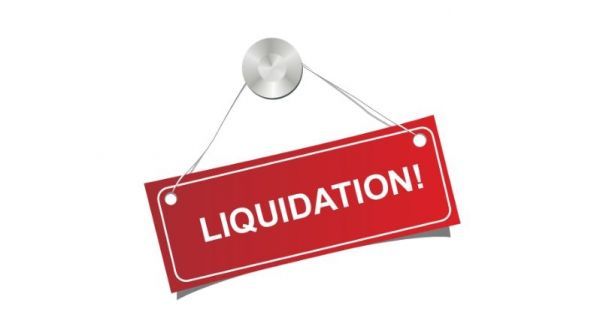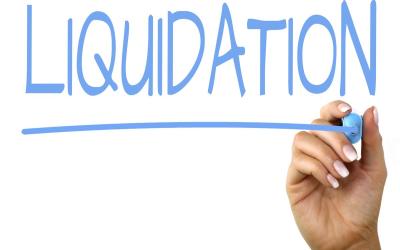Liquidation
Liquidation is the process of winding up a corporation or incorporated entity.
Following are the situations where an order for liquidation is passed by the Adjudicating Authority:

(a) When a Resolution Plan which is required under Section 30(6) of Insolvency Code, 2016 is not received before the expiry of the insolvency resolution process period or the maximum period permitted for completion of the corporate insolvency resolution process under section 12 of Insolvency Code, 2016 or
the fast track corporate insolvency resolution process under section 56 of Insolvency Code, 2016, as the case may be (section 33(1)(a) of Insolvency Code, 2016)
(b) When the Adjudicating Authority (NCLT) rejects the resolution plan submitted to it under section 31 for the non-compliance of the requirements specified.
(c) Where before the approval of a resolution plan, the resolution professional intimates to the NCLT the decision of Committee of Creditors (COC) approved by not less than sixty-six per cent of the voting share to liquidate the corporate debtor.
(d) Where a resolution plan approved by the Adjudicating Authority is contravened by the corporate debtor, any person other than the corporate debtor, whose interests are prejudicially affected by such contravention, may make an application to the Adjudicating Authority for a liquidation order. If the adjudicating authority determines that the corporate debtor has indeed contravened the resolution plan, it shall pass a liquidation order.
Company Liquidation Process & Steps
Stage I: Appointment of Liquidator
- Appointment of Liquidator (Section 34) who has submitted the written consent in Form AA of Schedule II
- A public announcement needs to be made in Form B of Schedule II within five days of the pronouncement of the order for liquidation to invite claims, which shall be submitted inside 30 days from the liquidation initiation date
Stage II: Verification of Claims & Reporting
- The liquidator shall receive or collect the claims of creditors within a period of 30 days from the date of commencement of liquidation.
- A Financial Creditor, Operational Creditor or Any other creditor may submit a claim to the liquidator with such supporting documents required to prove the claim as may be specified by board.
- A creditor who is partly Financial or Operational shall submit claim to liquidator to the extent of his financial debt in the manner as provided in sub-section (2) and to the extent of his operational debt under sub-section (3)

- The Liquidator shall verify the claims within 30 days from the last date for receipt of claim.
- After verification of claims liquidator may either admit or reject the claim, in whole or in part, as the case may be however he shall record the reason in writing for such rejection.
- The Liquidator shall communicate his decision of admission or rejection of claims to the creditor within 7 days of such admission or rejection of claim.
Stage III: Reports to be prepared by Liquidator
Asset Memorandum – To evaluate the assets and property of Corporate Debtor in the manner as may be specified by the Board.
Progress Report – To report the progress of the Liquidation Process in the manner as may be specified by the Board.
Preliminary Report – Report prepared in accordance with Regulation 13.
First Progress Report – Quarterly Report prepared in accordance with Regulation 15.
Sale Report – Enclosed with Progress Report after sale of each asset.
Stage IV- Distribution of proceeds
The Liquidator shall form Liquidation Estate (subject to inclusions and exclusions) and open a bank account in the name of the corporate debtor, followed by the words “in liquidation,” in a scheduled bank, for the receiving the amounts due to the CD and initiate the sale of assets.
The liquidation process of any CD under the IBC Code shall be completed within one year from the liquidation commencement date, even if applications for avoidance transactions are pending.
The liquidator shall not sell any property, whether immovable, movable or any actionable claims of the corporate debtor under liquidation, to any person who is ineligible under section 29A of the Code to become a resolution applicant.

The proceeds from realisation shall be distributed by the Liquidator within 90 Days (earlier six months) from the receipt of the amount among the stakeholders. (Regulation 42)
The liquidator shall distribute the assets per the waterfall mechanism (Section 53) after the filing of stakeholders and the asset memorandum with the Adjudicating Authority.
Stage IV- Dissolution of Corporate Debtor under IBC
After liquidating all the corporate debtor’s assets, the Liquidator must file an application before the Adjudicating Authority for the corporate debtor’s dissolution under Section 54 of the Code.
If the Liquidator believes that there are insufficient realisable assets to cover the cost of the company liquidation and further inquiry is not necessary into the affairs of the corporate debtor, they may apply for an early dissolution (Regulation 14 of the Company Liquidation Regulations) at any time after the initial report is submitted.
Orders for dissolution should be filed with the appropriate authority where the CD is registered.
How S.K. Agrawal & Co. Helps in Liquidation Process?
- Providing Insolvency Professional who will act as Liquidator in Liquidation Process.
- Providing support services for holding Stakeholder Consultation Committee General Meeting.
- Providing support services for verification of Claims.
- Providing support services for filing of Documents with various Authorities – MCA, GST, Income Tax.

- Drafting of Asset Memorandum, Preliminary Report, Quarterly Report, Asset Sale Report & Final Report for submit before NCLT, IBBI and other Authorities.
- Drafting of Application for Dissolution of Company or for any other matters.
- Filing of application with the concerned bench of Hon’ble National Company Law Tribunal.
- Follow up and pleading of application filed with NCLT on behalf of the concerned applicant.
- Appearance before Hon’ble NCLT/NCLAT.
- Drafting of application for appeal to be filed before the Hon’ble National Company Law Appellate Tribunal.
- Follow up and pleading of application filed before Hon’ble National Company Law Appellate Tribunal.
Service Area
We provide strategic and qualitative advisory services to all our clients from domestic to international organizations, small, medium and large sized enterprises, assisting them with their incorporation and quality management services so they can establish their business successfully globally. To help them deal with their tax issues, financial and legal requirements we provide all support for post incorporation services, so they are able to run their business seamlessly. We are based at New Delhi and Faridabad, but our wings are spread to serve clients across the globe. Customer Satisfaction, Quality of Service and our Turnaround time are the drivers of our enthusiasm and success. We are continuously serving our client at Faridabad, Delhi, Gurgaon (Gurugram), Noida (Gautam Budh Nagar), Sonipat, Panipat, Palwal, Jind, Karnal, Meerut, Kolkata, Mumbai (Bombay), Pune, Bangalore, Nasik, Aurangabad, Nagpur, Ludhiana, Amritsar, Mohali, Hyderabad, Kanpur, Agra ,Rudrapur, Haridwar, Jamshedpur, and many other Industrial Areas.
